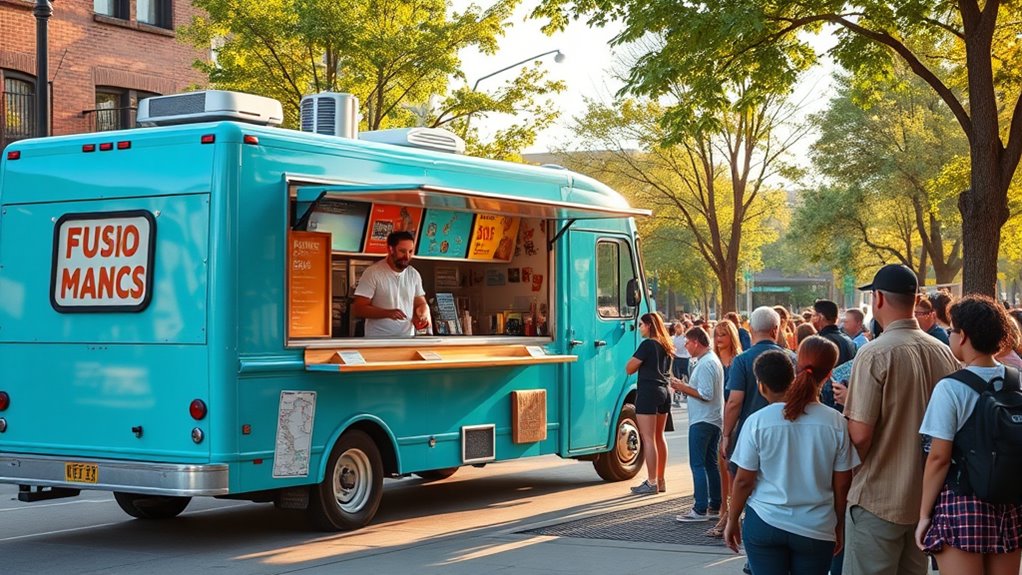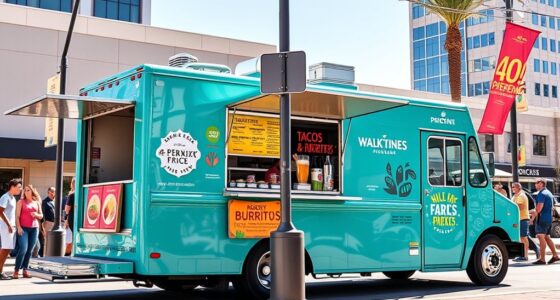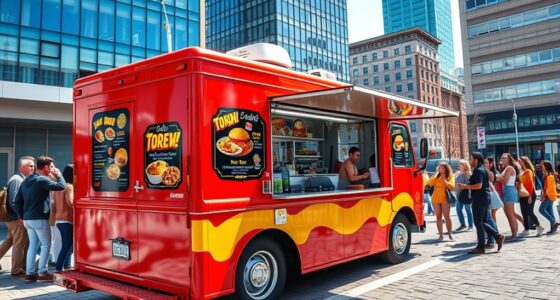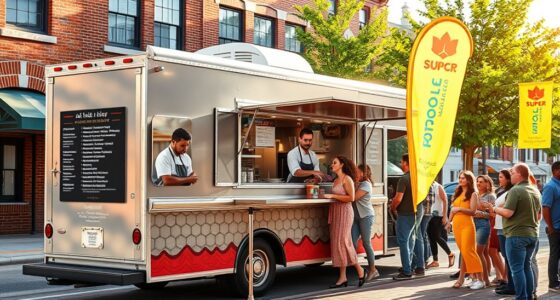To open a food truck in Rochester, you’ll need to secure permits like a Mobile Food Service Permit, health and safety licenses, and possibly a solicitor’s license, which involve costs from $1,500 to $28,000. Choose high-traffic spots such as downtown or festivals, develop a compliant menu with local suppliers, and use social media for marketing. Utilizing commissary kitchens helps reduce startup costs and improve operations. Keep exploring for detailed steps to get your business rolling smoothly.
Key Takeaways
- Obtain necessary permits such as Mobile Food Service, health, fire, and solicitor’s licenses, and submit permit applications at least 10 days prior.
- Budget $50,000 to $250,000 for vehicle, equipment, permits, and initial inventory; consider using commissary kitchens to reduce startup costs.
- Target high-traffic locations like downtown, festivals, markets, and landmarks; secure special permits for public spaces and respect parking regulations.
- Develop allergen-aware menus using trusted local suppliers, ensuring proper storage, labeling, and compliance with food safety regulations.
- Promote your food truck via social media, participate in community events, and implement loyalty programs to build customer engagement.
Navigating the Permitting Process in Rochester
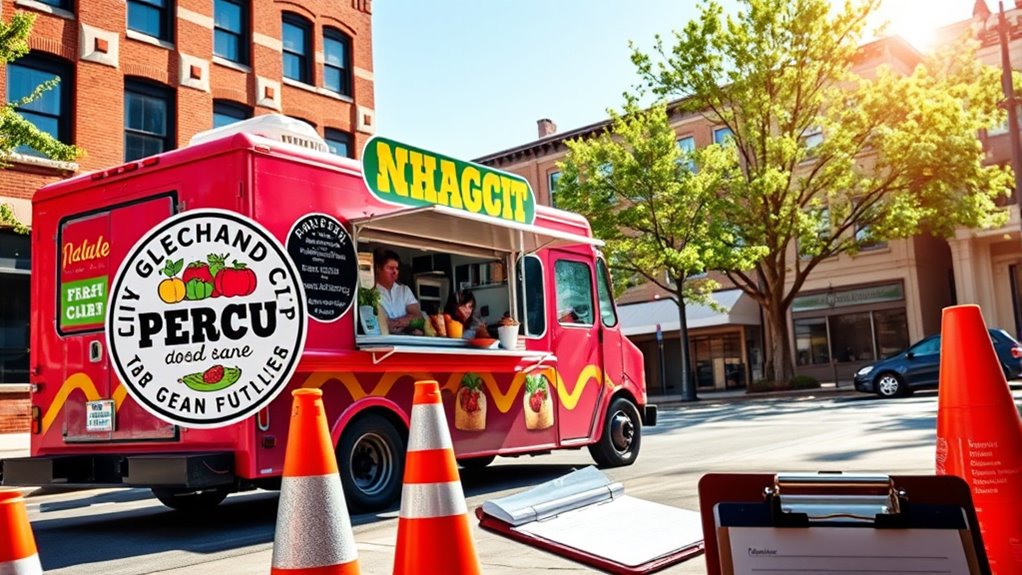
Are you ready to start your food truck journey in Rochester? First, you’ll need to complete a Mobile Food Service Permit application for your truck, trailer, or cart. If you plan to vend within Rochester city limits, you’ll also need a solicitor’s license from the City Clerk’s Licensing Office. For events, submit Temporary Food Service Permits at least 10 days in advance. Before operating, you’ll require plan approval, and payments are made online after receiving an invoice. You’ll also need health and safety certifications, including a health department permit, food handler’s permits, and fire certificates for safety compliance. Additionally, securing a zoning letter is essential to confirm your chosen location is approved. These steps guarantee your food truck meets all local regulations and is ready to serve, ensuring compliance with local licensing laws. Staying informed about sustainable practices can also help your business appeal to environmentally-conscious customers.
Understanding the Costs and Fees for Mobile Food Operations
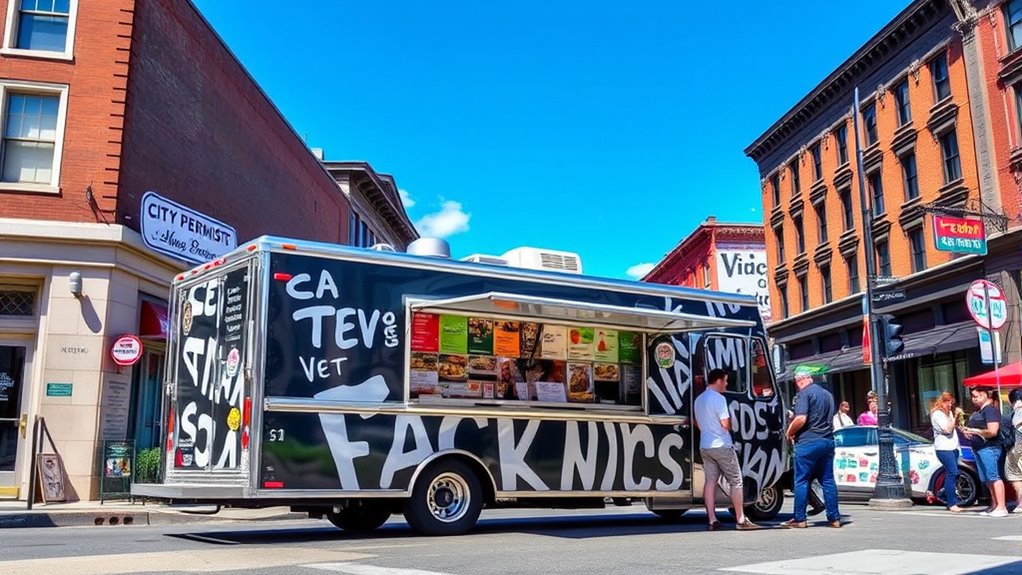
Starting a food truck in Rochester involves a range of costs that you need to carefully plan for. Initial expenses typically range from $50,000 to $250,000, covering the vehicle, kitchen equipment, and outfitting. A new or custom-built truck can cost between $40,000 and $150,000, while outfitting includes kitchen installation tailored to your menu. Permits and licenses can vary widely, from $1,500 to $28,000, depending on city requirements. Operating costs, including fuel, supplies, staffing, and maintenance, average $5,000 to $10,000 monthly, with fuel expenses around $500 to $1,000. Inventory costs start at $2,000 to $3,000 initially. Don’t forget marketing—branding, website, and digital promotion can add to your upfront investment but are essential for attracting customers. Additionally, understanding the costs and fees for mobile food operations is crucial for budgeting effectively and ensuring compliance with local regulations.
Choosing Prime Locations for Your Food Truck Business
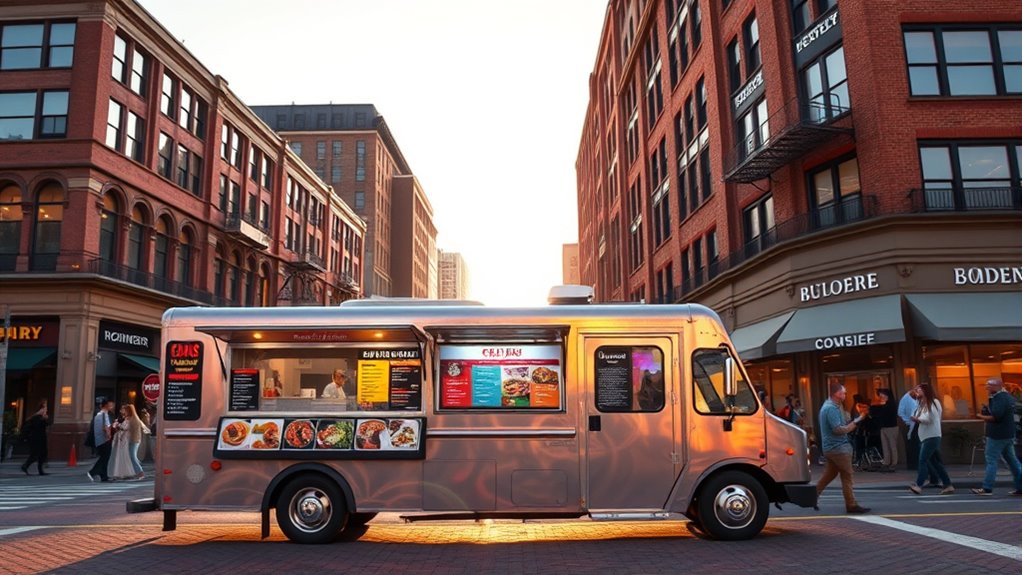
To attract steady customers, you need to choose locations with high foot traffic, such as downtown areas or busy event venues like festivals and markets. Accessibility and parking are also essential, ensuring your truck can easily set up and stay compliant with local regulations. By targeting these prime spots, you’ll boost visibility and maximize your sales potential. Additionally, considering the presence of popular food options like BBQ, pizza, and desserts in Rochester can help you select locations where your offerings will complement existing busy vendors and attract more customers. Incorporating compact designs for easy transport and storage can further enhance your ability to move between prime spots efficiently.
Foot Traffic Hotspots
Finding the right location is essential for your food truck’s success, and high foot traffic areas are your best bet. Downtown Rochester is a top spot, attracting office workers, shoppers, and tourists, especially near landmarks like the Rochester Riverside Convention Center and Eastman Theatre. Public squares such as Washington Square Park and Rochester Public Market see heavy pedestrian flow, particularly during lunch and weekends. Nightlife districts in East End and Park Avenue boost evening sales. Seasonal events like festivals and parades also bring large crowds. Universities like RIT and the University of Rochester generate steady traffic near student centers and athletic fields. Additionally, commercial districts, corporate parks, and popular venues like sports arenas create reliable spots with consistent foot traffic for your food truck. Gelato, a popular dessert option, can also attract crowds if you decide to diversify your menu.
Parking Accessibility
Choosing the right parking location is essential for your food truck’s success, and understanding parking regulations helps you avoid fines and disruptions. In Rochester, you must follow posted parking restrictions, even outside designated zones, and avoid backing into vending spots, which is prohibited. Parking meter fees don’t count as restrictions in permitted areas, but proper waste disposal is mandatory, with all trash kept in leak-proof containers and responsibly removed. When using private property, ensure you respect existing business parking and site plans to prevent violations, maintaining enough space for customer safety and queuing. In public spaces, special permits or fees are often required, and you must keep access clear for safety. Always carry a measuring wheel for compliance, and ensure your truck is equipped with onboard trash receptacles and fire safety gear.
Local Event Venues
Selecting the right event venues in Rochester can substantially boost your food truck’s visibility and sales. Popular spots like Chef’s Event Center & Party House in Spencerport offer indoor and outdoor spaces, ideal for diverse events and high-capacity crowds. The Daily Refresher at 293 Alexander Street provides a downtown location with designated truck parking, making it perfect for food truck-friendly gatherings. Washington Square Park hosts Food Truck Fridays, attracting lunchtime crowds with live music and entertainment. Many local parks and event centers partner with food trucks for festivals, weddings, corporate events, and community celebrations. These venues often feature outdoor areas, which allow for larger events and flexible scheduling. Partnering with established venues reduces logistical hassles and positions your truck for year-round opportunities. Additionally, some venues offer on-site event planning and marketing support, helping to boost your visibility in the community and maximize your outreach.
Developing a Compliant and Appealing Menu
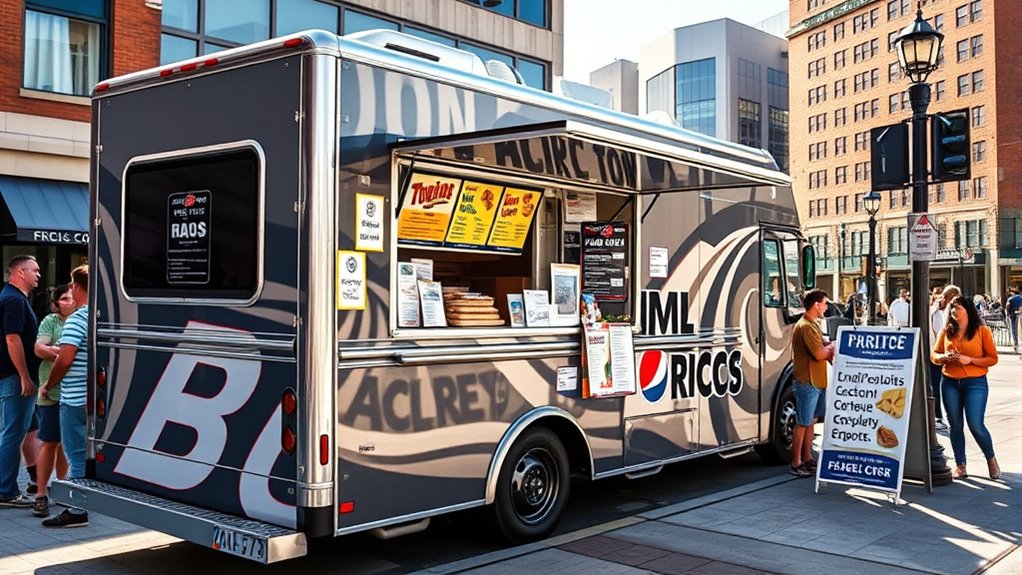
Creating a menu that meets Rochester’s food safety regulations and appeals to your customers takes careful planning. You need to include allergen statements, follow temperature controls, and choose ingredients that are safe to prepare on the go. By sourcing fresh, quality ingredients and designing a compliant menu, you can stand out and operate smoothly. Additionally, understanding the specific local health codes and regularly updating your menu to reflect seasonal ingredients can help maintain compliance and attract repeat customers. Incorporating proper food handling techniques ensures safety and quality in every dish, which is essential for building customer trust.
Menu Regulations and Safety
Developing a compliant and appealing menu for your food truck in Rochester requires strict adherence to safety regulations and thoughtful design. First, verify all menu items follow the New York State Sanitary Code, including proper handling, storage, and preparation. Second, incorporate HACCP principles to identify and control hazards, especially when dealing with potentially hazardous foods like eggs or dairy. Third, design your menu to minimize cross-contamination by separating allergen-containing foods and maintaining designated prep zones. Use clear allergen labeling and provide easy access to hand washing stations. Additionally, prepare documentation for temperature controls, cleaning routines, and ingredient sourcing. Ensuring compliance with these safety standards not only safeguards your customers but also keeps your operation running smoothly and legally. Food safety regulations are regularly updated, so staying informed helps maintain compliance and protect your business. Implementing proper sanitation practices is essential to prevent foodborne illnesses and ensure a safe dining experience.
Ingredient Sourcing and Quality
How can you guarantee the ingredients for your Rochester food truck meet safety standards and appeal to customers? First, source from trusted local farms, farmer’s markets, and specialty suppliers for fresh, seasonal produce and niche ingredients like organic or ethnic items. Use licensed distributors for bulk staples and licensed processors for pre-made products, ensuring compliance with NY State regulations. Store ingredients properly—off the floor, at correct temperatures, and with approved ice sources—to prevent contamination. Maintain detailed records of supplier licenses, ingredient origins, and batch information for traceability and safety recalls. Follow labeling laws, including allergen disclosures, and avoid prohibited ingredients like CBD or fermented foods. Supporting local and sustainable suppliers enhances your menu’s appeal and demonstrates your commitment to quality.
Effective Marketing Strategies to Grow Your Customer Base
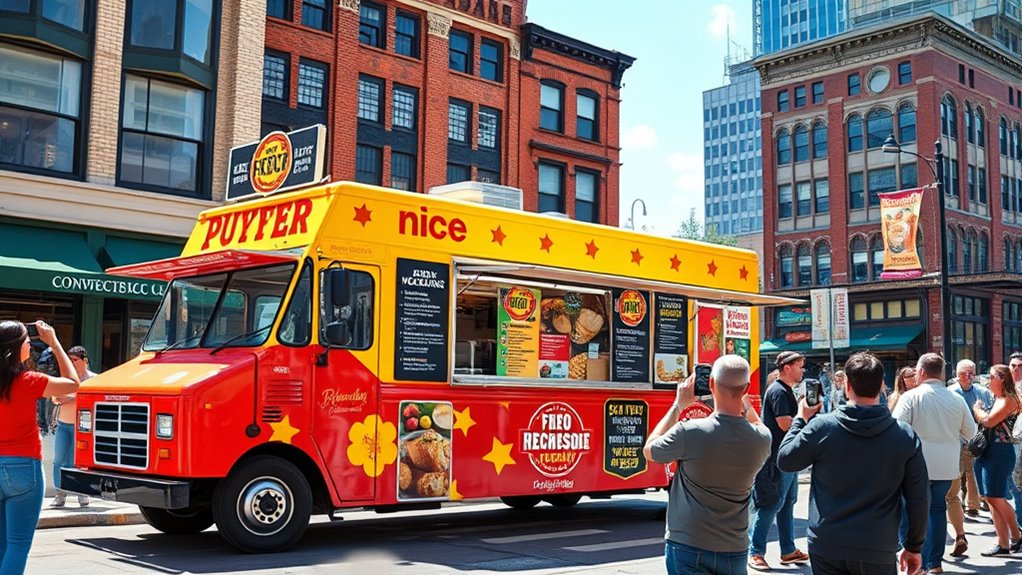
To effectively grow your customer base, leveraging a mix of targeted marketing strategies is essential. First, harness social media platforms, especially Facebook, which 75% of food trucks use to connect with customers. Regular engagement can boost spending by around 15%, and social ads help 40% of customers discover new trucks. Second, participate in local festivals and community events; 80% of trucks find these excellent for visibility and foot traffic. These events also allow sampling and immediate sales. Ultimately, implement loyalty programs like punch cards or mobile rewards, which increase repeat visits by 30%. Collect customer contact info and send personalized offers. Incorporating community-building techniques can also foster stronger customer relationships and loyalty. Research shows that incorporating seasonal and holiday-themed promotions can lead to a 25% rise in customer visits, combining these tactics will elevate your presence, foster loyalty, and expand your Rochester food truck’s customer base effectively.
Utilizing Commissary Kitchens and Operational Support Services
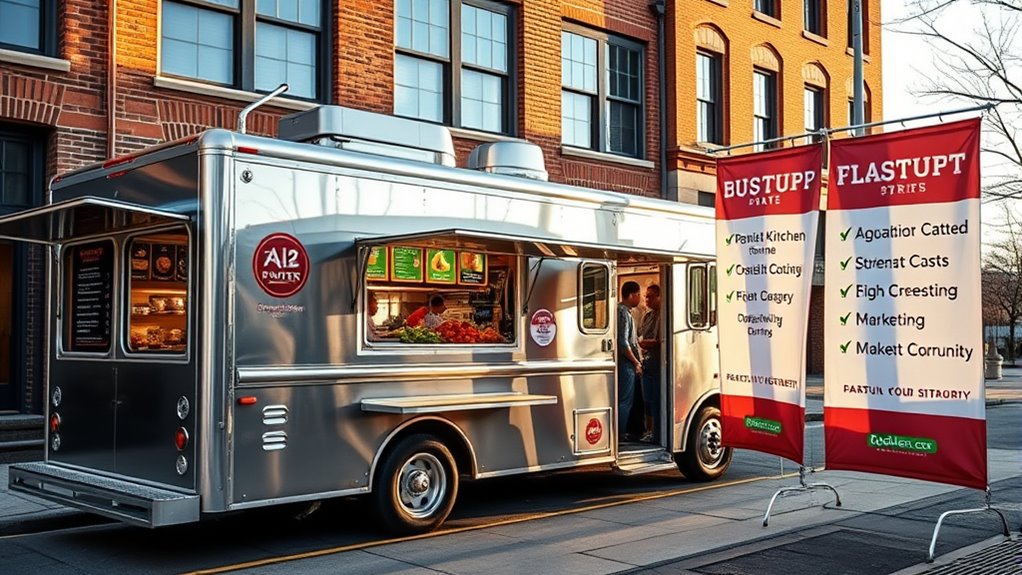
Utilizing commissary kitchens and operational support services can substantially boost your food truck’s efficiency and compliance. These licensed facilities offer fully equipped shared kitchens, reducing startup costs and eliminating the need for private build-outs. In Rochester, places like The Commissary provide access to commercial-grade appliances, storage, and community resources, helping you meet local health and safety standards. Commissary membership often includes business mentorship, marketing support, and administrative services like licensing assistance and supplier connections. They also facilitate testing and promoting your menu through events and pop-ups. Cost-wise, expect hourly rates around $22, with flexible hours and no long-term leases, making scaling easier. Using a commissary simplifies compliance, streamlines operations, and helps you establish a professional, compliant food truck business in Rochester. Additionally, these facilities can serve as a central hub for networking with other vendors and industry professionals, further supporting your business growth.
Frequently Asked Questions
Are There Specific Vehicle Requirements or Size Restrictions for Food Trucks in Rochester?
You want to know about vehicle requirements or size restrictions for food trucks in Rochester. Currently, there aren’t explicit size limits set by local regulations, but your truck must meet safety standards, including kitchen exhausts and fire systems. You also need proper registration, permits, and compliance with city and health department rules. Keep in mind, your vehicle must fit permitted vending locations and adhere to local parking and space restrictions.
Can I Operate My Food Truck Outside of Rochester City Limits?
Imagine the open road ahead, your food truck ready to serve beyond Rochester’s borders. You can operate outside city limits, but you’ll need a valid state license and local permits from each municipality. Keep in mind, zoning rules, parking restrictions, and fees vary, so check local regulations carefully. With proper permits, you can reach new customers, but staying compliant guarantees smooth sailing everywhere you go.
What Are the Insurance Requirements for Mobile Food Vendors in Monroe County?
You need to meet specific insurance requirements to operate as a mobile food vendor in Monroe County. Make sure you have at least $1 million per occurrence and $3 million total coverage, with Monroe County as an additional insured. You’ll also need auto liability insurance, workers’ compensation if you have employees, and proof via an ACORD certificate. Keep your documentation current to avoid permit issues or shutdowns.
Are There Any Restrictions on Alcohol Sales or Serving Beverages From Food Trucks?
You should know that selling alcohol from your food truck comes with strict restrictions. You need proper licensing from the NY State Liquor Authority, and alcohol must be served with food that meets minimum requirements. Sales are limited to sealed containers for take-out, and you must follow local rules on hours and locations. Additionally, compliance with health and zoning laws is essential to avoid fines or permit issues.
How Do Weather Conditions Impact Food Truck Operation and Permitting in Rochester?
Weather conditions in Rochester substantially impact your food truck operations and permits. Cold winters and snow make outdoor vending difficult, leading to seasonal permit restrictions or cancellations. Rain, wind, and extreme temperatures can reduce customer turnout and complicate logistics. During milder months, you’ll have more flexibility, but you need to adapt by choosing sheltered locations, adjusting menus, and staying informed about weather forecasts to maximize sales and guarantee safety.
Conclusion
Starting your food truck in Rochester is a big step, but with the right permits, locations, and marketing, you’re well on your way. Keep your eyes on the prize and stay organized to avoid any bumps in the road. Remember, Rome wasn’t built in a day, so be patient and persistent. With dedication and a little know-how, your food truck will soon be the talk of the town.
